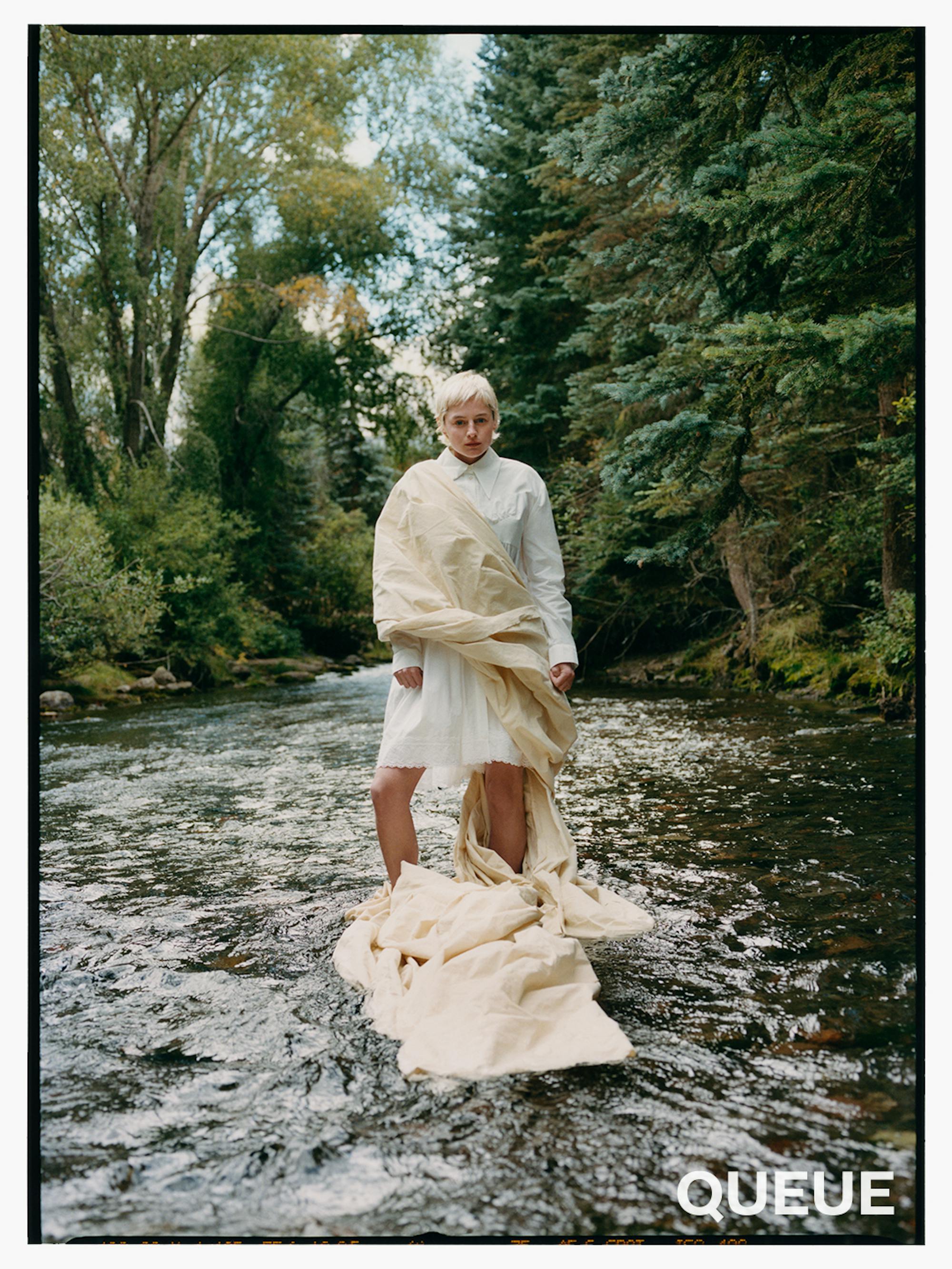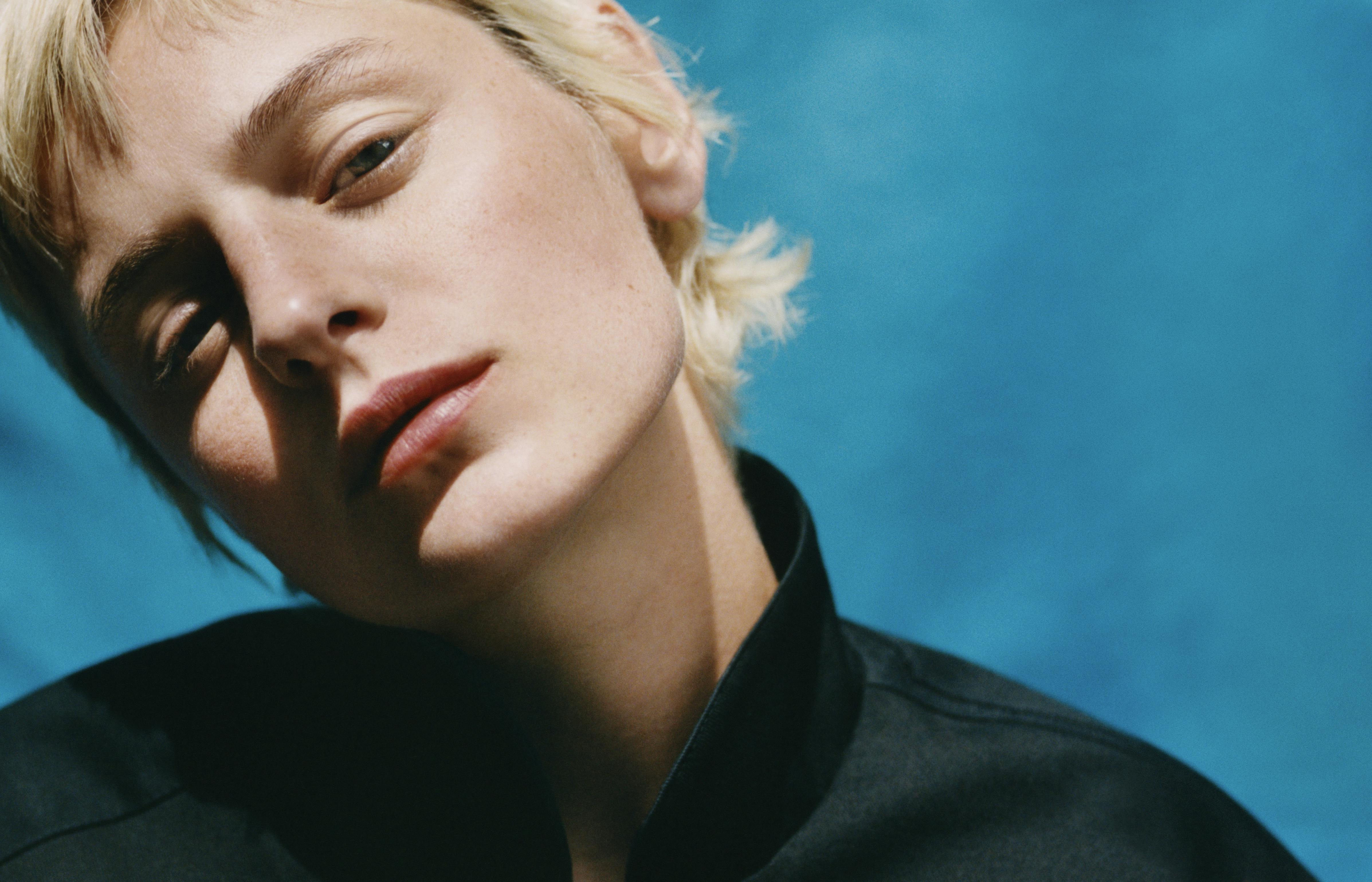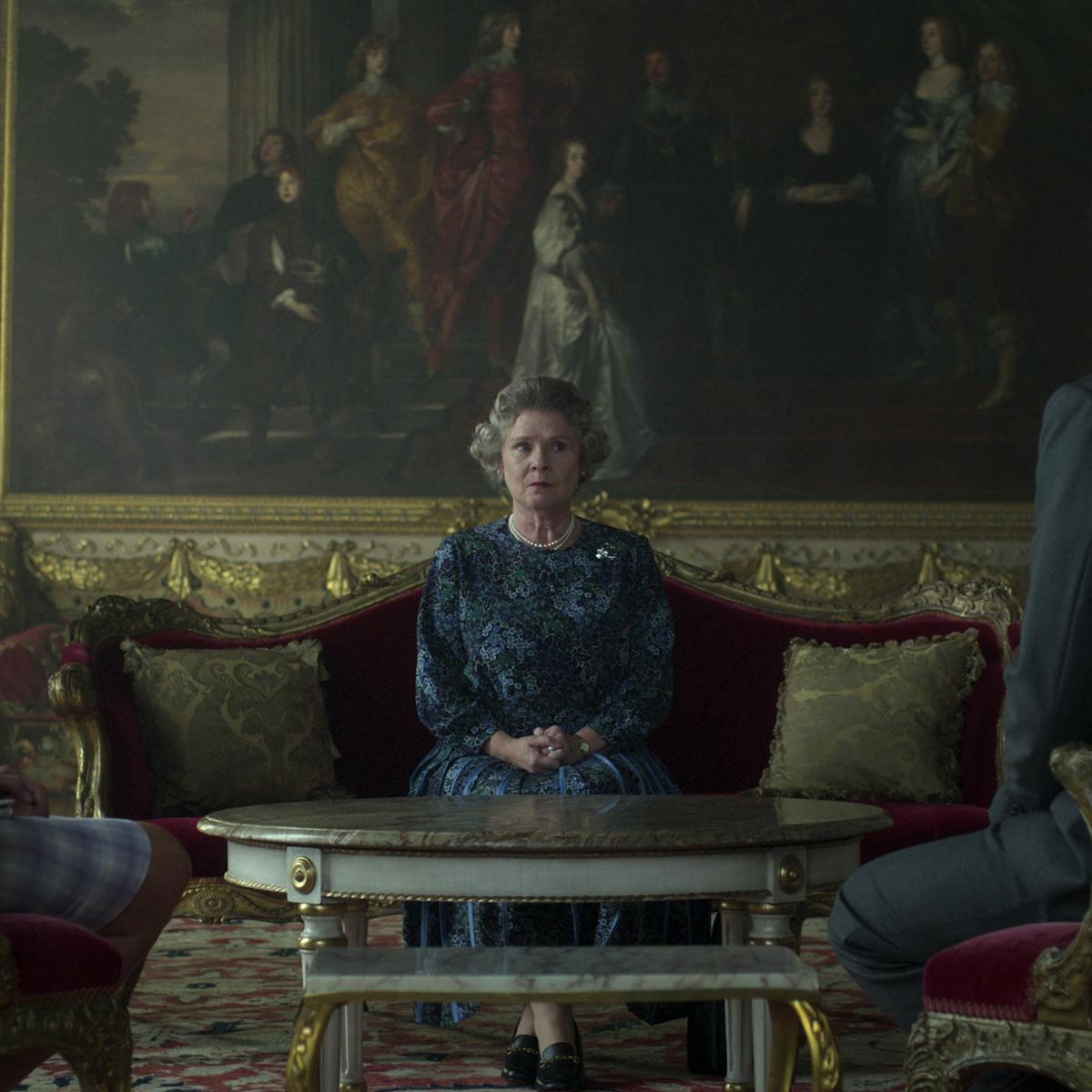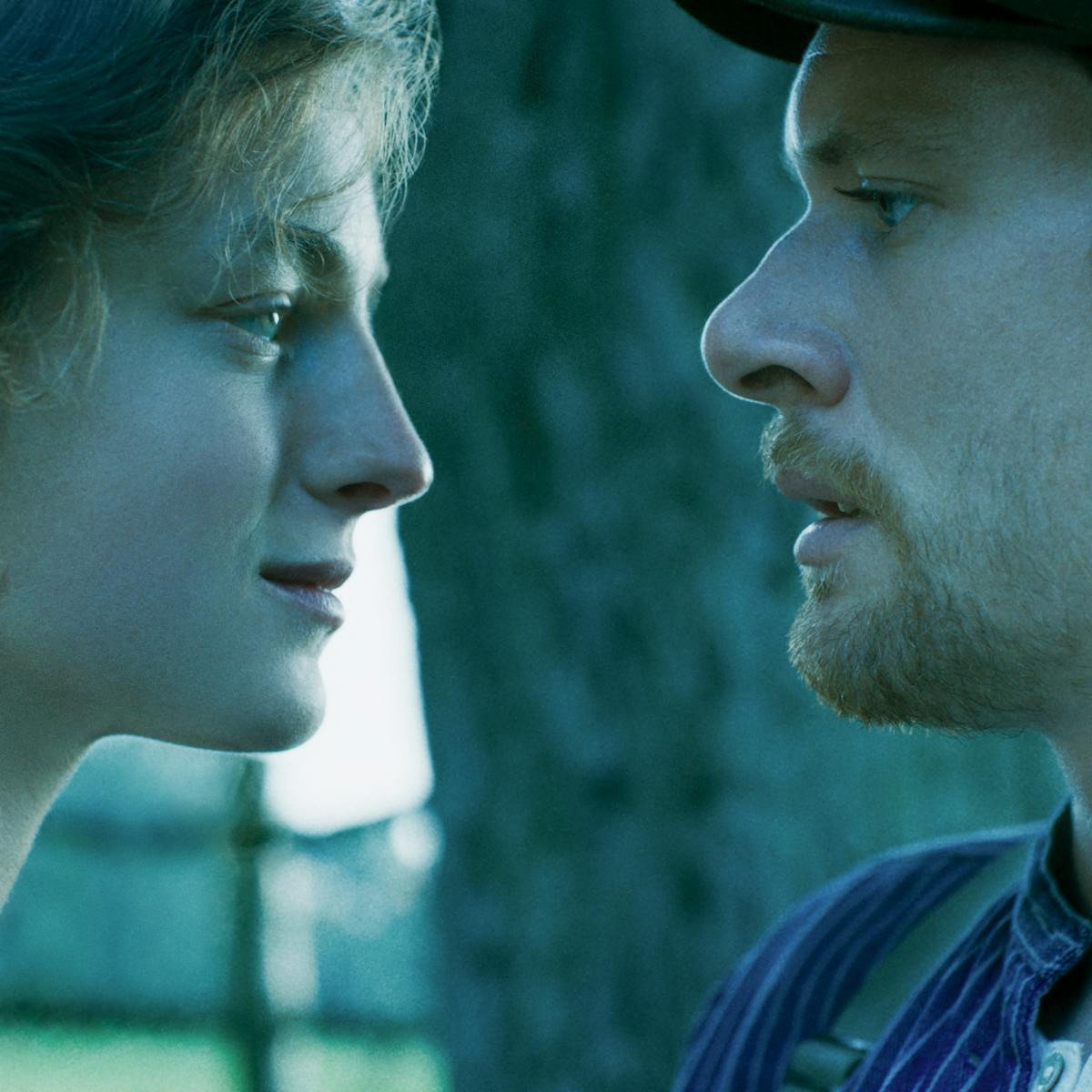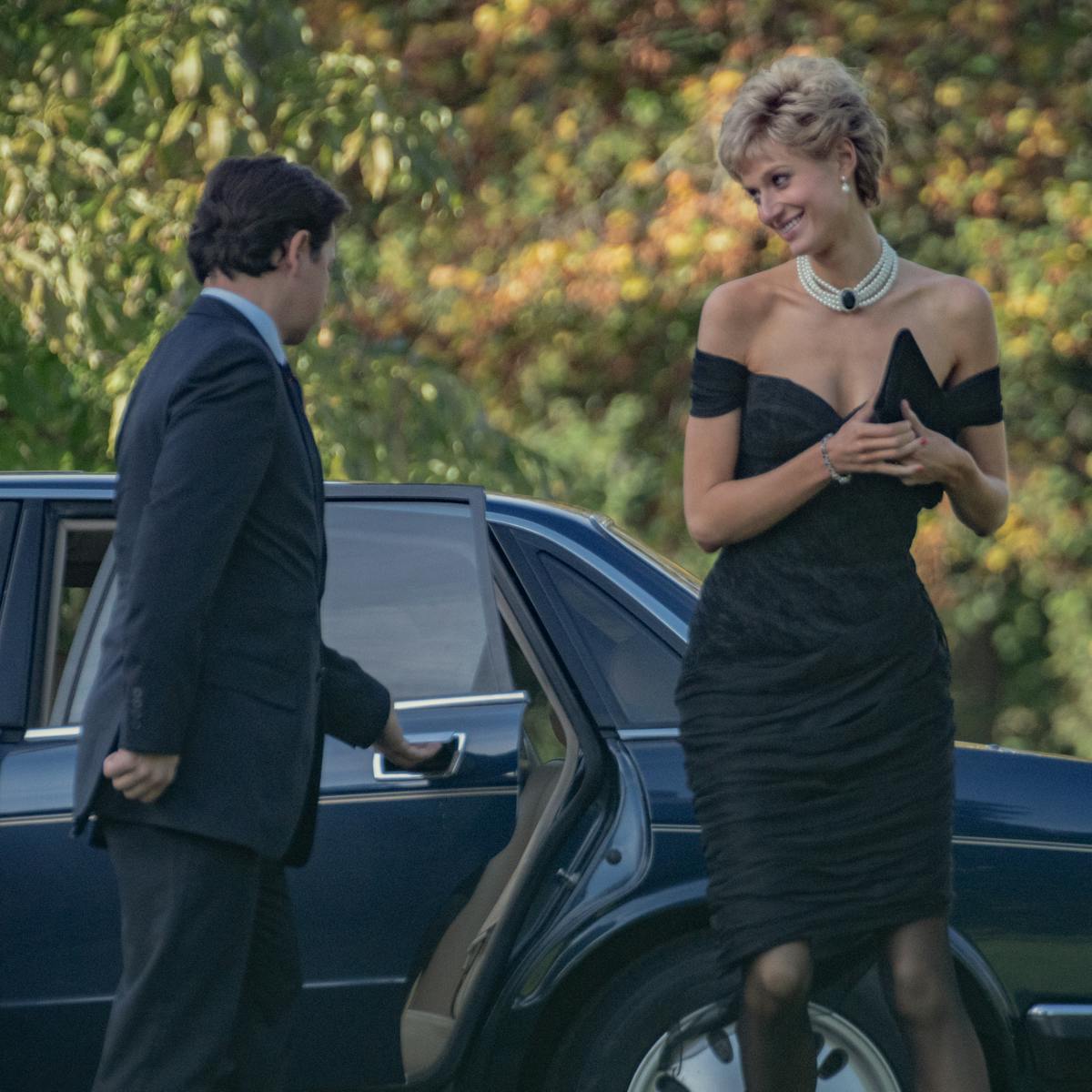Emma Corrin stars in Laure de Clermont-Tonnerre’s Lady Chatterley’s Lover, which examines the power of a sexual awakening.
Several days before speaking to Emma Corrin, I made the trip back to my parents’ home in rural Shropshire to dig out the copy of D.H. Lawrence’s Lady Chatterley’s Lover that I first illicitly read as a teenager. It has a kitsch cover: a line drawing of a woman in a pink slip being clasped by her sturdy, hairy-armed lover. A small sprig of flowers is held suggestively over her pubic area, hinting at the book’s general direction. Lawrence’s controversial last novel was finished in 1928 but faced an uphill, three-decade battle toward getting into the public’s hands. Initially privately published in Italy, followed by France a year later, it was only released in the U.K. in 1960 following a six-day obscenity trial, during which chief prosecutor Mervyn Griffith-Jones infamously asked whether this was the sort of novel “you would even wish your wife or servants to read.” Penguin Books triumphed, and the initial print run of 200,000 copies sold out within a day.
Over the intervening years, some of Lady Chatterley’s Lover’s covers have been coy, featuring simple decorative details or phoenixes rising from the ashes. Others have been happy to signpost the sexually explicit plot, often via suggestive portraits of entwined couples or titillating details like an unbuckled belt or a single, stylized nipple.
If a cover is a minor interpretation — a brief framing device intended to entice the reader, capturing some vital essence of what lies inside — then a film is a chance to approach the text completely afresh. French director Laure de Clermont-Tonnerre’s new adaptation of Lawrence’s novel is full frontal. It is a lush, lusty production. The cinematography is verdant, the costumes gorgeous, and the orgasms mutual. “We [were] romping around in the woods and the river for weeks,” Corrin explains, describing this particular take on the classic as “a very honest portrayal of a woman’s journey with sex.”
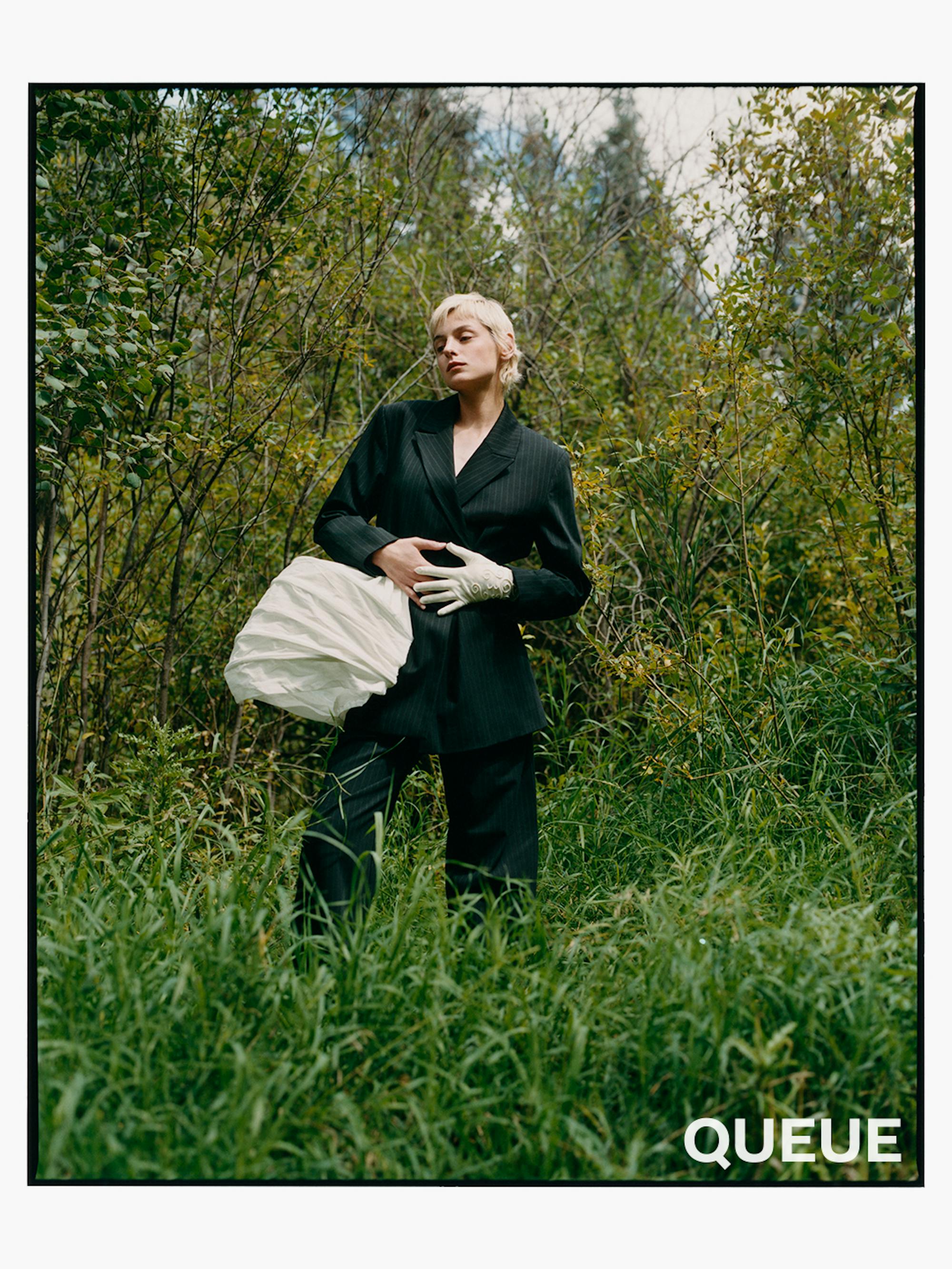
Corrin stars opposite Jack O’Connell as the headstrong Connie Chatterley: an upper-class woman trapped in a stifling, sexless marriage who experiences an awakening at the hands of gamekeeper Oliver Mellors. Although Corrin, who uses they/them pronouns, had seen the film before it went into its final edit, they were prepared to watch with the audience during the drama’s premiere at the prestigious Telluride Film Festival. But the prospect of seeing themselves deliver such a deeply revealing performance surrounded by people became too much in the moment. “I really thought I was going to be able to. I sat down, got half an hour in, and then it’s that scene where she starts to masturbate,” they say over Zoom with a wide smile, one arm wrapping instinctively around their body. “And I was like, Nah, I’m good actually.”
However, it’s precisely this frankness that attracted Corrin to Connie. Although there was no sneaking the book off their parents’ shelves during adolescence, their first encounter with the text was still a pleasing shock. “If the book came out now, I feel people would talk about it — the fact that it [was written] in the 1920s is mindblowing,” they observe, explaining that they went on a D.H. Lawrence deep dive after securing the part. “I felt it was so modern. The way he uses the word fuck. He’s so explicit within sex and within intimacy, and yet it doesn’t feel gratuitous.”
“Fuck” featured heavily alongside various other four-letter words in the opening speech from the prosecuting council at the 1960 trial, intended to scandalize the jury. The tide of propriety was turning though. As Philip Larkin wrote in his 1967 poem “Annus Mirabilis,” “Sexual intercourse began/ In nineteen sixty-three . . . Between the end of the Chatterley ban/ And the Beatles’ first L.P.” The overturned ban did indeed usher in an era of sexual liberation. Sixty years on, though, Corrin remains circumspect about our own supposedly free age of expression. “Especially in the U.S. with everything that’s going on with book banning and abortion laws. There’s so much censorship. I didn’t realize the extent to which L.G.B.T.Q.I.A.+ books are being banned all over the country.”
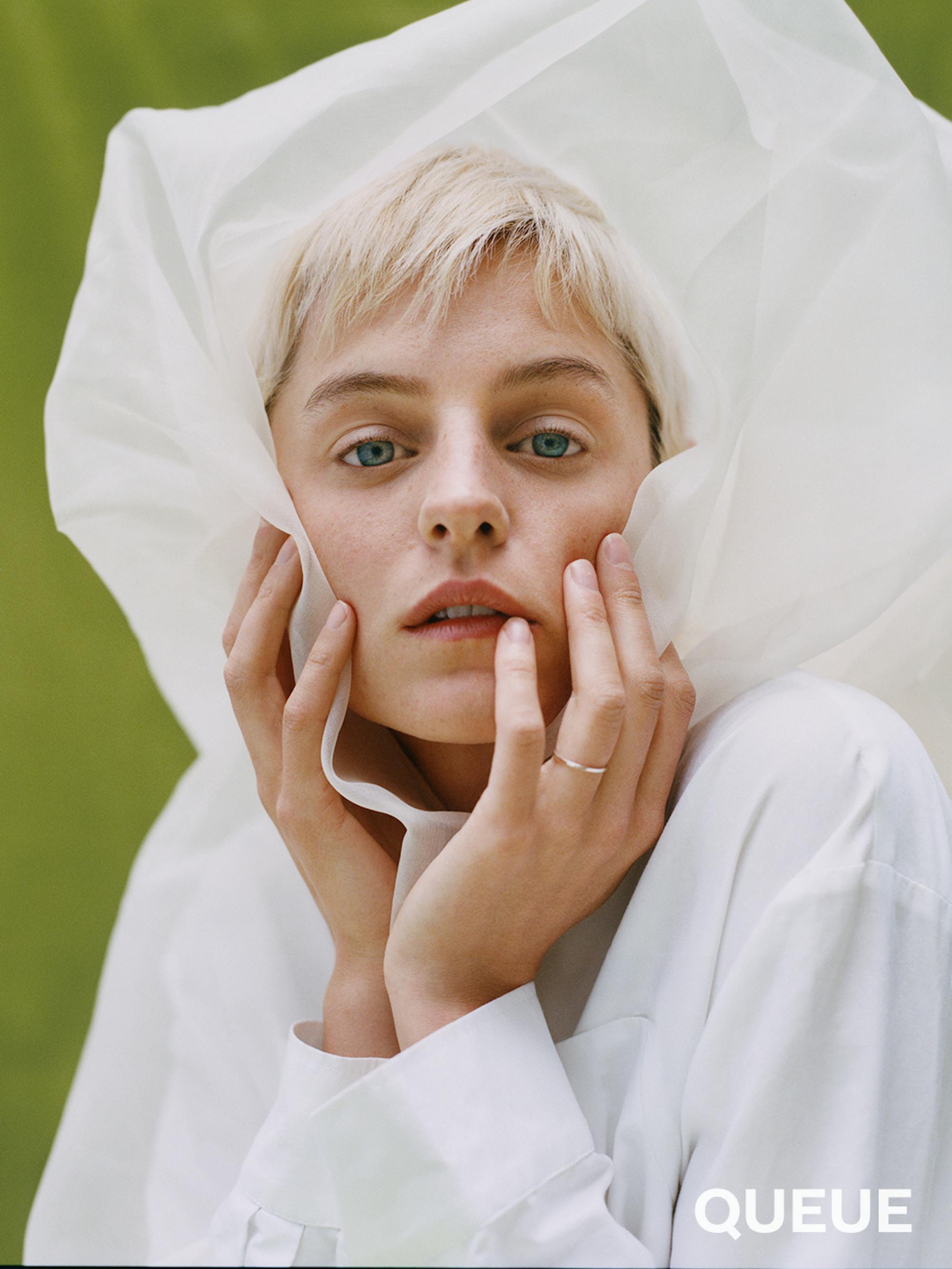
Corrin often seems to approach their roles with a scholastic level of interest. The 26-year-old, who grew up in Kent with their speech therapist mother, businessman father, and two younger brothers, took an academic route into acting. After being rejected twice by drama schools, they studied education at Cambridge and made full use of the university’s thriving student drama scene, putting on productions and appearing in plays including Romeo and Juliet, Love’s Labour’s Lost, The House of Bernarda Alba, Coriolanus, and The Master and Margarita. After they graduated, they appeared in TV series including Grantchester and Pennyworth, but it was their casting as a hesitantly youthful Lady Diana Spencer in Season 4 of The Crown, all downcast eyes and crystalline vowels, that spurred their rapid ascent to fame. Playing one of the most famous women in the world might have been a daunting prospect, especially for an actor still at the beginning of their career, but Corrin approached it forensically: reading biographies, watching documentaries, meeting people who’d known Diana, obsessively picking apart the mannerisms and speech patterns that might help them not just embody the late princess, but also really understand her. When the season hit Netflix in November 2020, the verdict was unanimous: Corrin’s performance was a triumph — painfully, brilliantly uncanny. The following year they went on to win a Golden Globe and Critics Choice Television Award for Best Actress in a Drama Series, as well as a Screen Actors Guild Award for Outstanding Performance by an Ensemble in a Drama Series.
Given The Crown’s pie-crust collars and Sloaney haircuts, costume dramas might now seem familiar territory. However, Connie is a very different kind of character. Although she shares a couple of key experiences with Diana (marrying into an emotionally austere, even posher family than her own; embarking on an affair to meet a hunger that cannot be fulfilled elsewhere), Connie’s bid for freedom is not so much an escape as a gradual unfolding, full of clandestine joy and revelation. “I read [the script] and it scared me and excited me,” Corrin explains. “I thought, Whoa, I don’t know if I could do that. And that was reason to do it. I’d never seen female pleasure or female sexuality placed at the forefront of a film before, in that way.” The prospect of being directed by Clermont-Tonnerre, whose debut feature The Mustang premiered at Sundance in 2019, appealed too: “I was a huge fan of Laure. She’s so brilliant to work with and has such a sensitivity.” Although The Mustang was geographically and situationally worlds apart, starring Matthias Schoenaerts as a person in prison working with wild horses, Corrin sees some parallels between that project and this one. “She’s drawn to stuff that explores people being trapped and then liberated through different environments.”
Corrin’s performance is luminous. Connie, a bohemian, intelligent young woman with a great gusto for life, is slowly suffocating in her husband Clifford’s gloomy country home Wragby, where they move after he is paralyzed from the waist down during the First World War. It takes the physical and intellectual kinship of Mellors — a working-class man who has also been bruised by an unhappy marriage — for Connie to understand what she needs. “We all do that when we’re young, especially around that age of early twenties,” Corrin says. “You think you have some kind of knowledge of yourself, and then you realize that you don’t. There’s so much more to discover. I liked her mind and her energy and how she was searching for something, [even if] she wasn’t quite sure what she was searching for.”
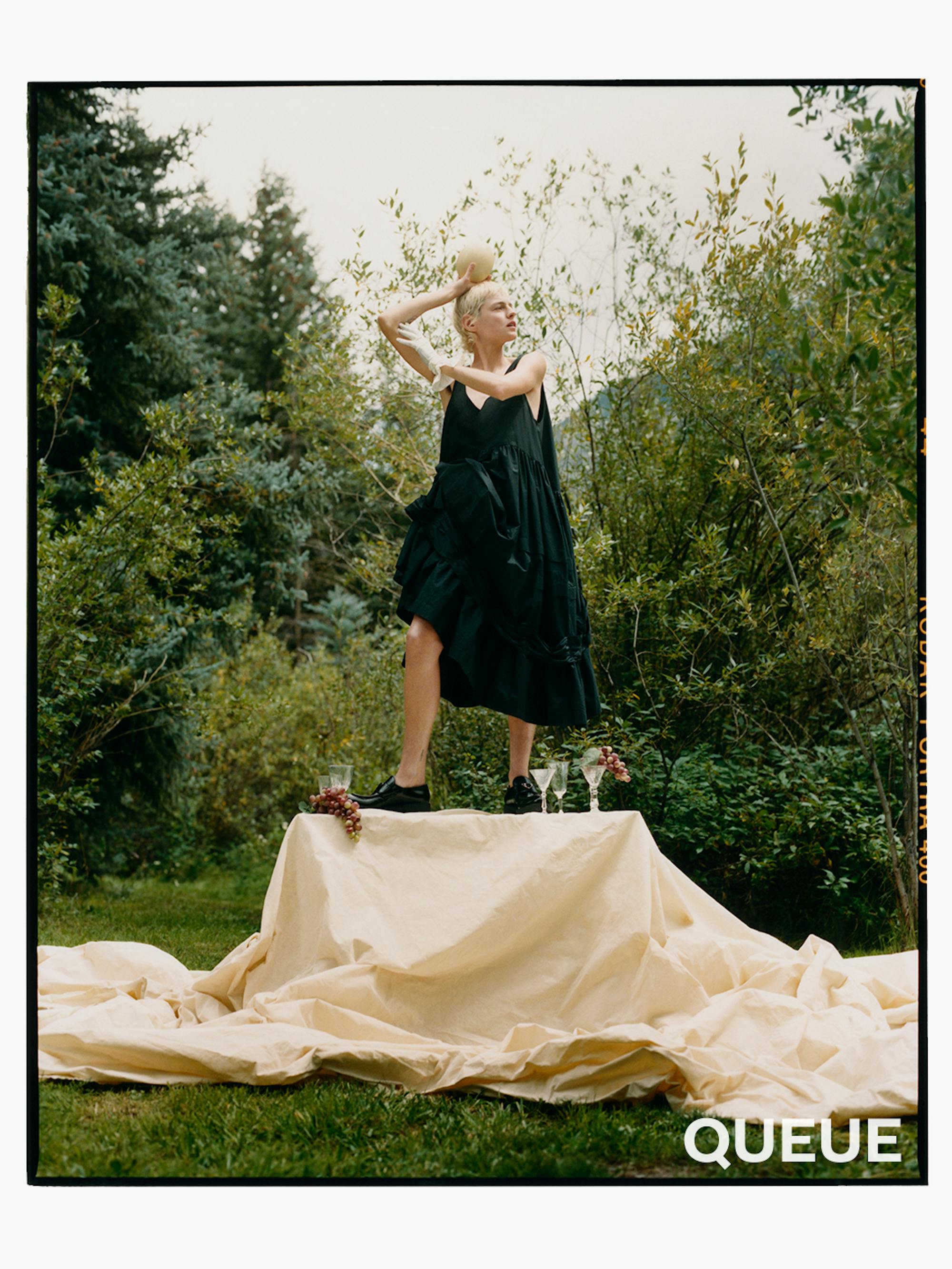
We watch Connie move from brittle frustration, all tensed jaws and inner dissatisfaction that occasionally shifts into mute fury, toward an uninhibited state of bliss. This new sexual union — hot, wanting, reciprocal — undoes her. It opens her up to the world. In playing Connie, Corrin was encouraged by movement coach Polly Bennett, with whom they also worked on The Crown, to register this change in different parts of their body. When Connie was around Clifford, everything had to be played purely from the waist up: “You’re contained here . . . always on the edge.” With Mellors, “Something’s been unlocked and it’s the whole of her.” In one memorable scene, Connie strips off and dances nude in the rain, entreating Mellors to do the same.
Corrin was attached to the project before the search for the right Mellors began. Given the levels of intimacy required, the actor had to be someone who could balance great vulnerability and rawness with physical magnetism — not just “the gruff guy who lives in the woods, who represents sex,” as Corrin puts it. O’Connell, whose career from the days of Skins and Starred Up onward has tended toward explorations of the sensitive spots that lie beneath hard, masculine exteriors, was the perfect fit. “We got on well, we’re very good friends,” Corrin says, adding that they rehearsed intensively with Sex Education and Master of None intimacy coordinator Ita O’Brien beforehand, blocking every sex scene beat by beat like a dance. “I think [they] are just the most brilliant people, and so essential. You wouldn’t do a stunt without a stunt coordinator, so why would you do a sex scene without an intimacy coordinator?”
Back to the rain though. Lady Chatterley’s Lover was shot on location last autumn near Oswestry, in the rural borderlands between England and Wales. The rain scene came early on in filming and wasn’t choreographed. “We hadn’t done sex scenes before then, so that was the first time we had done any kind of nudity together,” Corrin says. “I remember us both running out into the middle of this valley with seven rain machines . . . I was terrified, [but] looking into this other person’s eyes and seeing your terror matched and knowing that in that moment all you have is that other person, and that you trust them and that you feel safe . . . it was a really intense bonding experience.” It was also, apparently, a really chilly experience. Nudity presents all sorts of delicate negotiations from personal self-consciousness to on set protocols, but sometimes the concerns are more practical. When the story you’re telling is largely one about nature as a liberatory space away from the gloomily oppressive, socially stratified indoor world, you’re also going to have to get very used to shivering.
There’s quite a lot of unity. This is probably the most comfortable I feel in my body.
Emma Corrin
Although it’s the sex part that tends to get all the focus, there are other, subtler themes to pull out of Lady Chatterley’s Lover: Lawrence’s interest in spiritual wholeness and the harmonizing between mind and body, for example. As an actor, does Corrin feel more connected to one or the other? They pause and ponder. “There’s quite a lot of unity. This is probably the most comfortable I feel in my body,” they say slowly. “I think there’s a lot to do with the journey of sexuality and gender that I’ve been on.” Corrin has been in the public eye for a relatively brief period. The fourth series of The Crown only debuted two years ago, during one of 2020’s many lockdowns. They quickly established themselves as a singular rising star, mesmerizing onscreen and happily idiosyncratic on the red carpet.
At the same time as navigating all this newfound success, the actor was also undergoing a more personal process of figuring themselves out. They came out as queer in April 2021 and nonbinary in July of the same year, updating their pronouns on Instagram to include they/them. There are some interesting parallels with Connie: the revelations of intimacy and the knowledge of what it means to inhabit one’s physical self with greater ease. “It was so much about the autonomy she felt over her body, which is something that I can hugely relate to, even if it’s not within a specifically female realm,” they add.
It seems like a time of settling for Corrin: horizons still wide open, with big expanses left to discover, but perhaps with a little more assurance of the strange world in which they’ve found themselves. They now see their rise to prominence during the pandemic as a blessing in disguise. “I’ve been lucky in having a buffer between me and the craziness. It’s meant that I can focus on work and tap into what I want to do, the stories I want to tell.”
